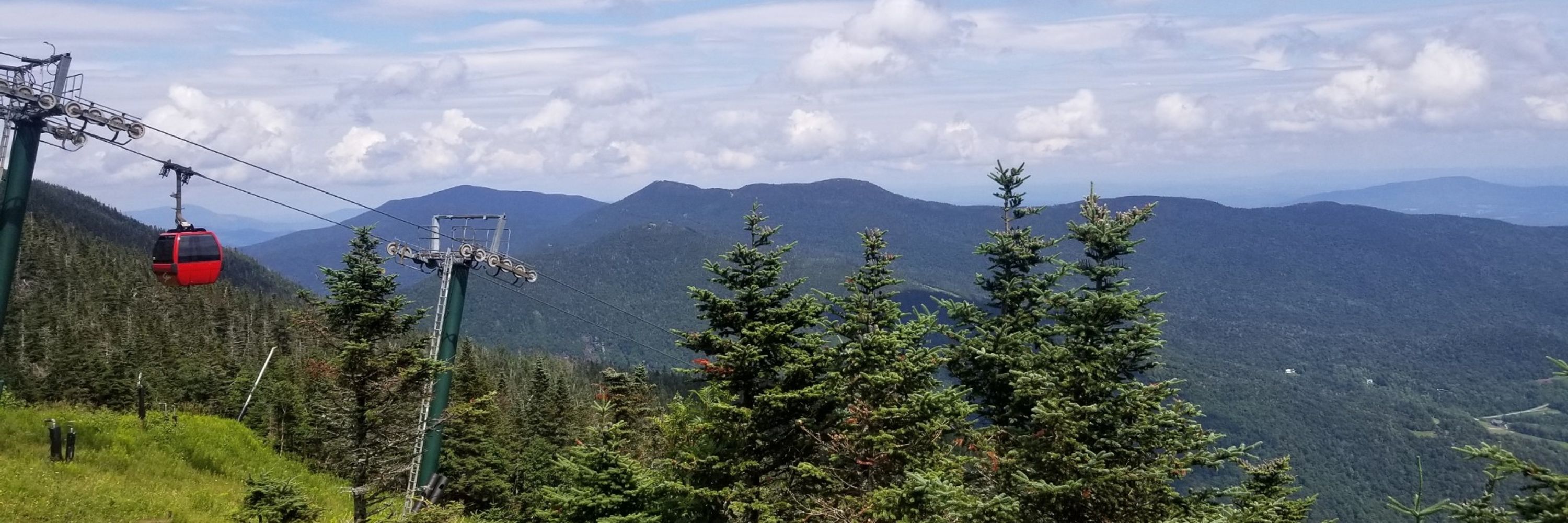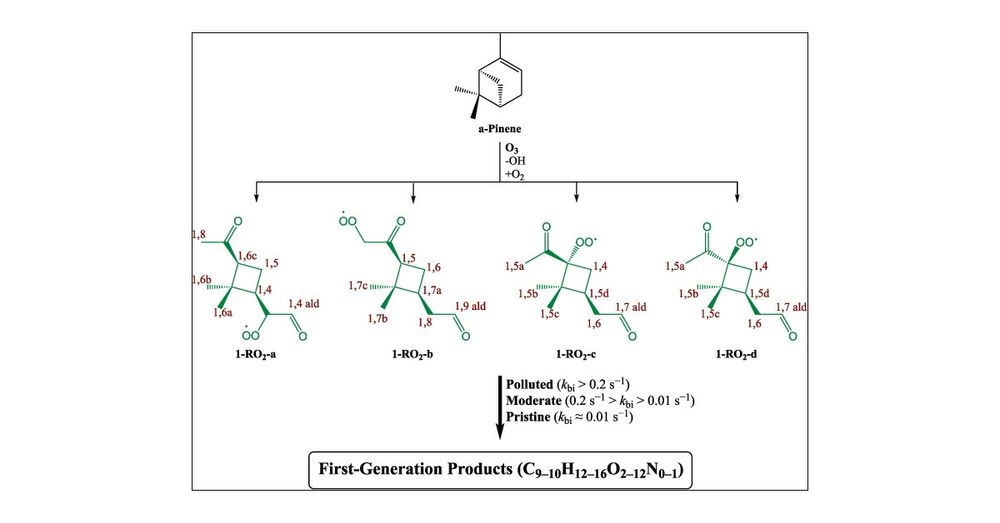
Christopher Kenseth
@chriskenseth.bsky.social
Atmospheric Chemist | NSF AGS Postdoctoral Fellow at UWAtmosSci | PhD at CaltechCCE | BS at UVMChemistry | VT → CA → WA
https://scholar.google.com/citations?user=ykDORWwAAAAJ&hl=en
https://scholar.google.com/citations?user=ykDORWwAAAAJ&hl=en
Pinned

Theoretical Mapping of the Gas-Phase Ozonolysis of α-Pinene: Formation of First-Generation Products under Different Atmospheric Conditions
Ozonolysis of α-pinene is a significant and well-established source of atmospheric secondary organic aerosol (SOA), which plays a pivotal role in climate, air quality, and human health. The products of α-pinene ozonolysis measured experimentally are typically characterized by only their molecular formulas, while their structures and formation mechanisms often remain unclear. In this work, we theoretically map the oxidation pathways, structures, and formation time scales of the major first-generation products formed from α-pinene ozonolysis by calculating the H-shift and bond-scission reaction rate coefficients of the peroxy (RO2) and alkoxy (RO) radicals that arise under atmospheric conditions with different RO2 bimolecular reaction rates (kbi): polluted (kbi > 0.2 s–1), moderate (0.2 s–1 > kbi > 0.01 s–1), and pristine (kbi ≈ 0.01 s–1). In polluted environments, almost no RO2 unimolecular reactions are of importance and ozonolysis leads to nitrates and small fragmented products. By contrast, in moderate to pristine atmospheres, C10 highly oxygenated organic molecules (HOMs) with up to 12 oxygen atoms can form from either purely unimolecular or a combination of unimolecular and bimolecular reactions. Our results suggest that explicit chemical mechanisms of α-pinene ozonolysis used ubiquitously in the literature require significant revision in their treatment of unimolecular-isomerization and stereoisomer-specific reactions.
share.google
Excited to share our new paper, out today in ACS ES&T Air! Using theory, we map the pathways of α-pinene ozonolysis leading to first-generation products under different atmospheric conditions.
Co-authors: Jing Chen (lead), @atmostaj.bsky.social, and Henrik Kjaergaard.
@uwatmossci.bsky.social
(1/2)
Co-authors: Jing Chen (lead), @atmostaj.bsky.social, and Henrik Kjaergaard.
@uwatmossci.bsky.social
(1/2)
Reposted by Christopher Kenseth
Congratulations to John Mak and all of GOTHAAM. The NSF-NCAR video summary really captures the magic of atmospheric chemistry

GOTHAAM: Air Quality Research in New York City
YouTube video by NSF NCAR & UCAR
youtu.be
November 5, 2025 at 2:51 PM
Congratulations to John Mak and all of GOTHAAM. The NSF-NCAR video summary really captures the magic of atmospheric chemistry
Reposted by Christopher Kenseth
Our paper examining the chemical conditions of past chamber studies is out! This work explores assumptions made when creating SOA parametrizations based on laboratory data, and can hopefully point to ways of improving model representation of SOA.
pubs.acs.org/doi/full/10....
pubs.acs.org/doi/full/10....

Re-Examining Chemical Conditions of Past Chamber Studies of Secondary Organic Aerosol Formation
The simulation of secondary organic aerosol (SOA) in 3D models generally relies on measurements made in laboratory chamber studies. However, many of the laboratory studies that underpin the aerosol pa...
pubs.acs.org
September 24, 2025 at 5:43 PM
Our paper examining the chemical conditions of past chamber studies is out! This work explores assumptions made when creating SOA parametrizations based on laboratory data, and can hopefully point to ways of improving model representation of SOA.
pubs.acs.org/doi/full/10....
pubs.acs.org/doi/full/10....
Reposted by Christopher Kenseth
Celebrating Richard Flagan's 50 years of service to @caltech.edu! Rick arrived in 1975 intending to study combustion chemistry and ended up playing an enormously influential role in developing new instrumentation to quantify atmospheric aerosol and helping to mitigate air pollution in LA and beyond.

September 19, 2025 at 9:54 PM
Celebrating Richard Flagan's 50 years of service to @caltech.edu! Rick arrived in 1975 intending to study combustion chemistry and ended up playing an enormously influential role in developing new instrumentation to quantify atmospheric aerosol and helping to mitigate air pollution in LA and beyond.
Reposted by Christopher Kenseth
Just watched the powerful new PBS documentary “Clearing the Air: the War on Smog”. My colleague Ellie Browne acted as Science Advisor. Very proud of her! www.pbs.org/wgbh/america...

Clearing the Air: The War on Smog | American Experience | PBS
The story of L.A.’s devastating smog problem and the creation of the EPA and the Clean Air Act.
www.pbs.org
September 3, 2025 at 3:53 AM
Just watched the powerful new PBS documentary “Clearing the Air: the War on Smog”. My colleague Ellie Browne acted as Science Advisor. Very proud of her! www.pbs.org/wgbh/america...
Excited to share our new paper, out today in ACS ES&T Air! Using theory, we map the pathways of α-pinene ozonolysis leading to first-generation products under different atmospheric conditions.
Co-authors: Jing Chen (lead), @atmostaj.bsky.social, and Henrik Kjaergaard.
@uwatmossci.bsky.social
(1/2)
Co-authors: Jing Chen (lead), @atmostaj.bsky.social, and Henrik Kjaergaard.
@uwatmossci.bsky.social
(1/2)

Theoretical Mapping of the Gas-Phase Ozonolysis of α-Pinene: Formation of First-Generation Products under Different Atmospheric Conditions
Ozonolysis of α-pinene is a significant and well-established source of atmospheric secondary organic aerosol (SOA), which plays a pivotal role in climate, air quality, and human health. The products of α-pinene ozonolysis measured experimentally are typically characterized by only their molecular formulas, while their structures and formation mechanisms often remain unclear. In this work, we theoretically map the oxidation pathways, structures, and formation time scales of the major first-generation products formed from α-pinene ozonolysis by calculating the H-shift and bond-scission reaction rate coefficients of the peroxy (RO2) and alkoxy (RO) radicals that arise under atmospheric conditions with different RO2 bimolecular reaction rates (kbi): polluted (kbi > 0.2 s–1), moderate (0.2 s–1 > kbi > 0.01 s–1), and pristine (kbi ≈ 0.01 s–1). In polluted environments, almost no RO2 unimolecular reactions are of importance and ozonolysis leads to nitrates and small fragmented products. By contrast, in moderate to pristine atmospheres, C10 highly oxygenated organic molecules (HOMs) with up to 12 oxygen atoms can form from either purely unimolecular or a combination of unimolecular and bimolecular reactions. Our results suggest that explicit chemical mechanisms of α-pinene ozonolysis used ubiquitously in the literature require significant revision in their treatment of unimolecular-isomerization and stereoisomer-specific reactions.
share.google
July 21, 2025 at 4:41 PM
Excited to share our new paper, out today in ACS ES&T Air! Using theory, we map the pathways of α-pinene ozonolysis leading to first-generation products under different atmospheric conditions.
Co-authors: Jing Chen (lead), @atmostaj.bsky.social, and Henrik Kjaergaard.
@uwatmossci.bsky.social
(1/2)
Co-authors: Jing Chen (lead), @atmostaj.bsky.social, and Henrik Kjaergaard.
@uwatmossci.bsky.social
(1/2)
Reposted by Christopher Kenseth
Thought-provoking quote from @atmostaj.bsky.social during the Weather and Climate Livestream about the role of "serendipity" in scientific discovery and the importance of having a broadly funded scientific enterprise that allows for it.
wclivestream.com/watch/
wclivestream.com/watch/
May 31, 2025 at 7:36 PM
Thought-provoking quote from @atmostaj.bsky.social during the Weather and Climate Livestream about the role of "serendipity" in scientific discovery and the importance of having a broadly funded scientific enterprise that allows for it.
wclivestream.com/watch/
wclivestream.com/watch/
Reposted by Christopher Kenseth
@NASA and @caltech.edu kineticist extraordinaire Stan Sander died Saturday night surrounded by his family. Stan was a kind mentor, inventive scientist and engineer. He will be sorely missed by me and many colleagues around the world.
March 24, 2025 at 12:13 PM
@NASA and @caltech.edu kineticist extraordinaire Stan Sander died Saturday night surrounded by his family. Stan was a kind mentor, inventive scientist and engineer. He will be sorely missed by me and many colleagues around the world.
Reposted by Christopher Kenseth
Here's the atmospheric chemistry starter pack! Let me know if you'd like to join! Looking forward to hearing about everyone's fun science on bluesky!
go.bsky.app/GgmWgSo
go.bsky.app/GgmWgSo
November 13, 2024 at 11:57 AM
Here's the atmospheric chemistry starter pack! Let me know if you'd like to join! Looking forward to hearing about everyone's fun science on bluesky!
go.bsky.app/GgmWgSo
go.bsky.app/GgmWgSo

